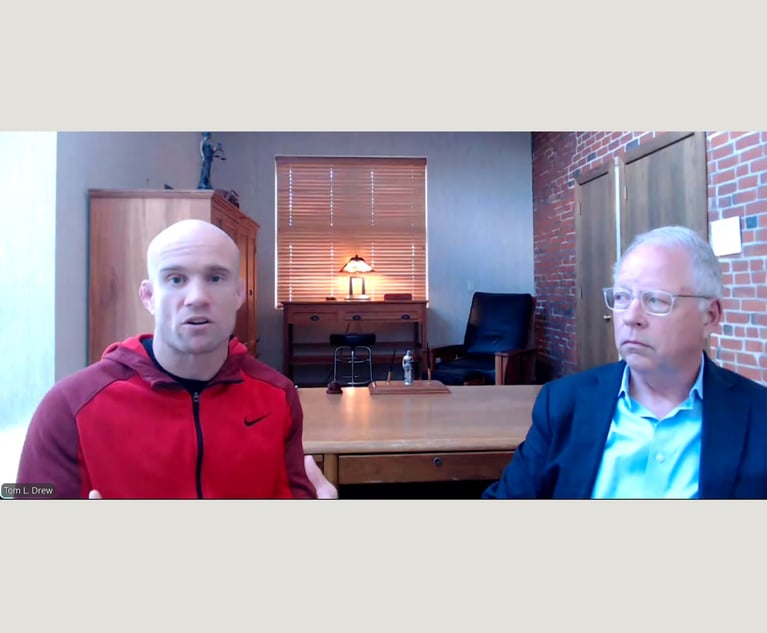 (Photo: Shutterstock.com)
(Photo: Shutterstock.com)The Bar Exam Becomes a Cause of Action
Picture yourself as a recent law graduate sitting in the middle of what has to be one of the most stressful days of your life wondering if you're going to be able to finish taking the blasted test that stands between you and being a licensed lawyer.
July 29, 2020 at 07:30 AM
5 minute read
Picture yourself as a recent law school graduate.
You've just put three years into your life pursuing a degree that has likely saddled you with six-figures' worth of debt—so much debt, it turns out, that you're likely to delay major life decisions like buying a house or starting a family, according to a recent study from the American Bar Association.
Debt aside, you're graduating into one of the most uncertain job markets that anybody alive can remember.
Ah, pandemic life.
Now, if you're aiming to practice in a venue that's moving ahead with its bar exam, picture yourself studying right now. Let's just forego the possibility of having you sit for the bar in a place like Oklahoma, which is actually making test-takers show up in-person this week. Or much less in a place like Virginia, where you not only have to show up, but have to don "traditional business attire" likely for the first time in months to take the test.
I'll place you in the less inhumane state of Michigan, where you as a test-taker likely sat down at a laptop yesterday that was loaded up with facial recognition software to verify your identity and track your eye movement to detect any anomalies.
Now, let's say after you wrapped up the first section of the test, you logged onto the website where you were supposed to get the password to the next portion of the test only to find it had crashed. You couldn't get through to the hotline set up by the software vendor ExamSoft. There you are. Sitting in the middle of what has to be one of the most stressful days of your life wondering if you're going to be able to finish taking the blasted test that stands between you and being a licensed lawyer with your sackful of debt.
Heart. Attack. City.
Alas, this isn't some nightmare scenario I dreamed up, nor is it some hackneyed law school exam hypothetical I'm using to test whether you creative lawyers can find a cause of action. This is what actually happened to some Michigan test-takers yesterday morning.
A Michigan Supreme Court spokesman yesterday told my colleague Karen Sloan shortly after the snafu surfaced via complaints from test-takers on Twitter that around 200 people were back taking the test within 10 minutes after the vendor support line and state officials were able to give out the password.
"ExamSoft pushed out an email with the password and everyone was able to get into the second module and start testing shortly thereafter," spokesman John Nevin told Karen (a great Twitter follow for all-things law school-related, by the way). "As a result of this delay, test takers were notified via email that the testing day will be adjusted to allow additional time and account for those who got in late."
ExamSoft said in a Twiter statement hashtagged #MichiganBarExam a few hours later that some test-takers experienced 30-minute delays, but that all had been able to complete the first two modules of the exam. Those who experienced delays had been given extra time to log in to later modules, the company said.
But, stop the presses, that wasn't the whole story. Late in the day, the company put out a further statement saying that it had been hit with a distributed denial of service cyber-attack, an attack meant to overwhelm an internet server with more traffic than it can handle.Even though ExamSoft is set to administer online bar exams for New York and California in the coming weeks—exams which will have exponentially more test-takers than did Michigan's—I likely wouldn't have put you through the thought exercise at the top of this column if not for prior litigation involving ExamSoft.
ExamSoft previously paid $2.1 million to settle class action claims a few years ago in a case brought on behalf of aspiring attorneys in 43 states. Those prior lawsuits, consolidated before U.S. District Judge Ursula Ungaro of the Southern District of Florida, targeted ExamSoft for its role in a problem back in 2014 which was given the moniker "Barmageddon" on the internet. In that instance, test-takers claimed they were prevented from uploading the answers to their essay questions by ExamSoft software meant to block users from accessing the internet or class notes while taking the test.
Interestingly, and perhaps ominously for ExamSoft should its cyber issues persist, the lineup of lawyers representing test-takers in that earlier round of litigation reads like a who's who of the privacy plaintiffs bar including John Yanchunis of Morgan & Morgan, Tina Wolfson of Ahdoot & Wolfson, and Jay Edelson of Edelson PC. Wolfson and Edelson didn't respond to messages Tuesday. Yanchunis wasn't immediately available for comment.
This content has been archived. It is available through our partners, LexisNexis® and Bloomberg Law.
To view this content, please continue to their sites.
Not a Lexis Subscriber?
Subscribe Now
Not a Bloomberg Law Subscriber?
Subscribe Now
NOT FOR REPRINT
© 2024 ALM Global, LLC, All Rights Reserved. Request academic re-use from www.copyright.com. All other uses, submit a request to [email protected]. For more information visit Asset & Logo Licensing.
You Might Like
View All

Helping Lawyers Move Away from ‘Grinding’ and Toward a ‘Flow’

Why Litigation Demand Might Break Firms’ Boom-and-Bust Cycle
Law Firms Mentioned
Trending Stories
- 1Justices Seek Solicitor General's Views on Music Industry's Copyright Case Against ISP
- 2Judge to hear arguments on whether Google's advertising tech constitutes a monopoly
- 3'Big Law Had Become Too Woke': Why Bill Barr Moved On
- 4Manhattan U.S. Attorney Damian Williams Announces Resignation from Office
- 5Governor Hochul Vetoes Bill Meant to Alleviate Public Notaries' Paperwork in Non-Electronic Acts
Who Got The Work
Michael G. Bongiorno, Andrew Scott Dulberg and Elizabeth E. Driscoll from Wilmer Cutler Pickering Hale and Dorr have stepped in to represent Symbotic Inc., an A.I.-enabled technology platform that focuses on increasing supply chain efficiency, and other defendants in a pending shareholder derivative lawsuit. The case, filed Oct. 2 in Massachusetts District Court by the Brown Law Firm on behalf of Stephen Austen, accuses certain officers and directors of misleading investors in regard to Symbotic's potential for margin growth by failing to disclose that the company was not equipped to timely deploy its systems or manage expenses through project delays. The case, assigned to U.S. District Judge Nathaniel M. Gorton, is 1:24-cv-12522, Austen v. Cohen et al.
Who Got The Work
Edmund Polubinski and Marie Killmond of Davis Polk & Wardwell have entered appearances for data platform software development company MongoDB and other defendants in a pending shareholder derivative lawsuit. The action, filed Oct. 7 in New York Southern District Court by the Brown Law Firm, accuses the company's directors and/or officers of falsely expressing confidence in the company’s restructuring of its sales incentive plan and downplaying the severity of decreases in its upfront commitments. The case is 1:24-cv-07594, Roy v. Ittycheria et al.
Who Got The Work
Amy O. Bruchs and Kurt F. Ellison of Michael Best & Friedrich have entered appearances for Epic Systems Corp. in a pending employment discrimination lawsuit. The suit was filed Sept. 7 in Wisconsin Western District Court by Levine Eisberner LLC and Siri & Glimstad on behalf of a project manager who claims that he was wrongfully terminated after applying for a religious exemption to the defendant's COVID-19 vaccine mandate. The case, assigned to U.S. Magistrate Judge Anita Marie Boor, is 3:24-cv-00630, Secker, Nathan v. Epic Systems Corporation.
Who Got The Work
David X. Sullivan, Thomas J. Finn and Gregory A. Hall from McCarter & English have entered appearances for Sunrun Installation Services in a pending civil rights lawsuit. The complaint was filed Sept. 4 in Connecticut District Court by attorney Robert M. Berke on behalf of former employee George Edward Steins, who was arrested and charged with employing an unregistered home improvement salesperson. The complaint alleges that had Sunrun informed the Connecticut Department of Consumer Protection that the plaintiff's employment had ended in 2017 and that he no longer held Sunrun's home improvement contractor license, he would not have been hit with charges, which were dismissed in May 2024. The case, assigned to U.S. District Judge Jeffrey A. Meyer, is 3:24-cv-01423, Steins v. Sunrun, Inc. et al.
Who Got The Work
Greenberg Traurig shareholder Joshua L. Raskin has entered an appearance for boohoo.com UK Ltd. in a pending patent infringement lawsuit. The suit, filed Sept. 3 in Texas Eastern District Court by Rozier Hardt McDonough on behalf of Alto Dynamics, asserts five patents related to an online shopping platform. The case, assigned to U.S. District Judge Rodney Gilstrap, is 2:24-cv-00719, Alto Dynamics, LLC v. boohoo.com UK Limited.
Featured Firms
Law Offices of Gary Martin Hays & Associates, P.C.
(470) 294-1674
Law Offices of Mark E. Salomone
(857) 444-6468
Smith & Hassler
(713) 739-1250







